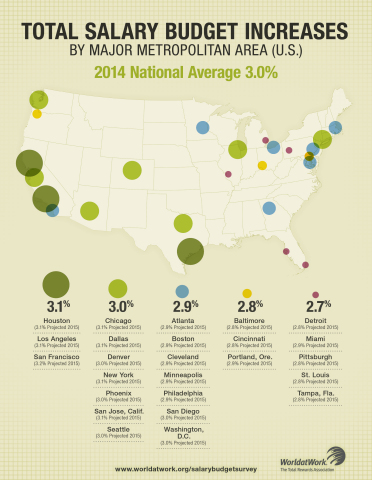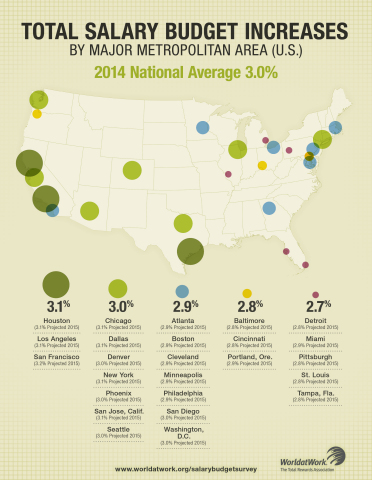WASHINGTON--(BUSINESS WIRE)--Pay increase budgets at U.S. employers have improved slightly up to 3.0 percent in 2014 from 2.9 percent in 2013 according to the 41st annual “WorldatWork 2014-2015 Salary Budget Survey.” Forecasts show that the average raise in base pay for 2015 in the United States is projected to be 3.1 percent.
This continues a trend of mildly increasing budgets since the 2009 recession when the average salary budget increase reached an all-time low of 2.2 percent (mean). Last year, respondents projected that the 2014 average total salary budget increase across all organizations, employee categories, regions and industries in the United States would reach 3.1 percent (median: 3.0 percent), but actual numbers fell just short.
“Salary increase budgets will likely remain close to the 3.0 percent mark until market forces require employers to raise wages more aggressively,” said Alison Avalos, research manager for WorldatWork. “Recovering from the recession is no longer driving employers’ salary budget planning. Current salary budget increase amounts are less about a recovery from widespread pay freezes from a few years back and more about the current marketplace not demanding much growth in the size of pay increases for employees.”
Most Common Salary Increase Budget Amounts
Organizations continue to converge on budget amounts between 2 percent and 4 percent, with 85 percent to 90 percent of all organizations landing there, depending on employee category. The percentage of organizations not awarding increases has dropped to 2 percent to 5 percent, fairly close to historical levels.
Major Metropolitan Area Data
Responding organizations reported variance in salary budget increase averages between major U.S. metropolitan areas, although all medians are at 3.0 percent. While there are no extreme outliers, there are a few areas that did not follow the national average trend line this year.
The following eight cities reported a decline from 2013 to 2014 by one to three-tenths of a percentage point in average total salary budget increases: Detroit; Miami; Minneapolis; Pittsburgh; Portland, Ore.; San Diego, St. Louis and Tampa, Fla.
Houston, Los Angeles and San Francisco trend above the national average, at 3.1 percent budget for pay increases for 2014, which represents no change from 2013.
Pay for Performance
Even though the size of all salary increase budgets, including merit budgets, remains on the conservative side, there is still good evidence of differentiation of awards.
“Organizations know that in order to retain top talent, they need to reward and motivate these important employees,” Avalos said. “They are doing so by differentiating salary increases and increasing the use of bonus programs.”
Looking at employee performance in 2013, organizations averaged a 2.7 percent merit increase for mid-level performers (median: 2.7 percent) and a 4.0 percent payout for top performers (median: 4.0 percent). Low performers averaged a 0.6 percent increase in 2013, although the median payout was zero.
Pay increases for 2014 performance are expected to remain at 2.7 percent for middle performers (median: 2.8 percent), and climb to 4.1 percent (median: 4.0 percent) for high performers.
Increased use of Bonus Programs
The 2014 data show that 74 percent of respondents are now utilizing market-based pay increases. Similarly, sign-on/hiring bonuses, spot bonuses, retention bonuses and project completion bonuses are all up in usage over past years, suggesting that organizations are beginning to pay more attention to retention of employees as the economy continues to improve. This reiterates what employers’ reported earlier this year in WorldatWork’s Bonus Programs and Practices survey.
About the Survey
The “WorldatWork 2014-2015 Salary Budget Survey” is the largest survey of its kind with 5,252 responses from 17 countries representing nearly 13 million employees. (Global Top-Level Results) WorldatWork collected survey data in April 2014. Survey respondents are WorldatWork members employed in the HR, compensation and benefits departments of mostly large U.S. companies. All data include zero-percent responses. An educational salary budget survey webinar will be held on Aug. 13.
Credentialed journalists may request a complimentary copy of the survey report by contacting melissa.sharp@worldatwork.org.
NOTE: WorldatWork includes zero-percent responses in the analysis, unless otherwise noted, because a zero represents a decision not to budget for a program and/or employee category that exists in the responding organization.
Salary Budget Survey archives: 1974-2013
CONNECT WITH US:
Facebook
LinkedIn
Twitter
YouTube
WorldatWork
Blog
About WorldatWork®
The Total Rewards Association
WorldatWork (www.worldatwork.org) is a nonprofit human resources association for professionals and organizations focused on compensation, benefits, work-life effectiveness and total rewards — strategies to attract, motivate and retain an engaged and productive workforce. WorldatWork and its affiliates provide comprehensive education, certification, research, advocacy and community, enhancing careers of professionals and, ultimately, achieving better results for the organizations they serve. WorldatWork has more than 70,000 members and subscribers worldwide; 95 percent of Fortune 500 companies employ a WorldatWork member. Founded in 1955, WorldatWork is affiliated with more than 70 local human resources associations and has offices in Scottsdale, Ariz., and Washington, D.C.




